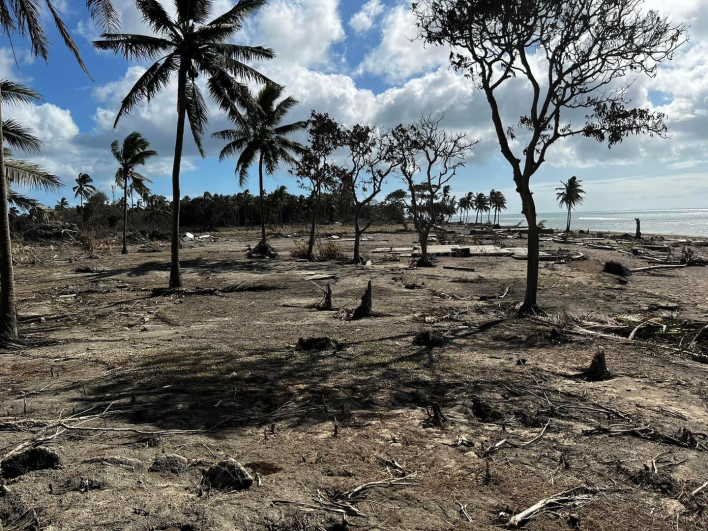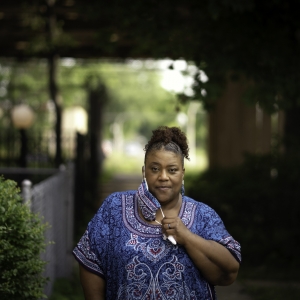Ocean water and volcanic ash have contaminated the drinking water of tens of thousands of people in the Pacific island nation.

Photo © Tonganow / Wikimedia Creative Commons
- On Sunday afternoon, just 40 miles off its coast, a powerful undersea eruption shook the Pacific island nation of Tonga.
- Volcanic ash, along with ocean water from the tsunami, has contaminated the drinking water of tens of thousands of people.
- Delayed in part by ash that covered Tonga’s airport runways, first aid did not reach the island until Thursday, five days after the initial impact.
By Laura Gersony, Circle of Blue — January 24, 2022
Five days after a volcanic eruption and tsunami, the Pacific island nation of Tonga has the look of an antique photograph. Its tropical vegetation, once vibrant in the spray of the sea, is covered in a layer of ash. Tree trunks lie defeated on the forest floor. Building debris litters the landscape, a sepia painting of detritus and upturned roots.
On Sunday afternoon, just 40 miles off its coast, a powerful undersea eruption shook the country — exploding, scientists estimate, with the force of hundreds of Hiroshima bombs. The impact sent 50-foot waves smashing against the archipelago’s small islands while nearly 400,000 lightning bolts crackled overhead in the 12 hours after the eruption.
“When the first explosion happened, our ears were ringing. We couldn’t hear each other,” Marian Kupu, a Tongan journalist, told The Guardian. “All we [could] do is point to our families: ‘get up, get ready to run.’”
Now that the dust has settled, drinking water is the top concern. The Red Cross told Reuters that volcanic ash, along with ocean water from the tsunami, has polluted the drinking water of tens of thousands of people. Red Cross officials warn that public health issues could soon follow.
“Securing access to safe drinking water is a critical immediate priority…as there is a mounting risk of diseases such as cholera and diarrhea,” said Katie Greenwood of the International Federation of Red Cross and Red Crescent Societies.
The United Nations has called drinking water the “biggest life-saving issue” on the islands.
“We remain seriously concerned about access to safe water for 50,000 people throughout the country,” said spokesperson Stéphane Dujarric in a briefing on Friday. “Water quality testing continues, and most people are relying on bottled water.”
Delayed in part by ash that covered Tonga’s airport runways, first aid did not reach the island until Thursday, five days after the initial impact. Since then, a New Zealand aid ship has docked carrying 250,000 liters of water and desalination equipment able to produce 70,000 liters more per day.
The eruption tore apart other pieces of Tonga’s physical infrastructure. It severed undersea communication cables, silencing Internet and cell contact on the islands for days. International telephone links were reconnected on Wednesday, though restoring full internet service could take over a month, the country’s telecommunications provider said.
As systems blink back on, information has emerged piecemeal. The blast took at least three lives, according to a statement from the Tonga government released on Tuesday, including two Tongan citizens and one British national. Property damage has been extensive. Hundreds of homes were destroyed in the tsunami, including all of the homes on tiny Mango Island, and all but two homes on the island of Fonoifua. Crashing waves devastated the coast of Tongatapu, a commercial center that is home to Tonga’s capital city.
“Along the western beaches there is a moonscape where once beautiful resorts and many, many homes stood,” Rachel Moore, Australia’s high commissioner to Tonga, told Australian radio.
Though calamitous, the event was not entirely unexpected. The World Risk Index ranks Tonga the third most vulnerable to natural hazards out of 181 countries. Some have speculated that this familiarity with risk saved lives after the blast; government officials told the Wall Street Journal that the nation’s regular tsunami drills protected people from injury and death.
The Tonga government has declared a state of emergency lasting until February 13.
Laura Gersony covers water policy, infrastructure, and energy for Circle of Blue. She also writes FRESH, Circle of Blue’s biweekly digest of Great Lakes policy news, and HotSpots H2O, a monthly column about the regions and populations most at-risk for water-related hazards and conflict. She is an Environmental Studies and Political Science major at the University of Chicago and an avid Lake Michigan swimmer.




